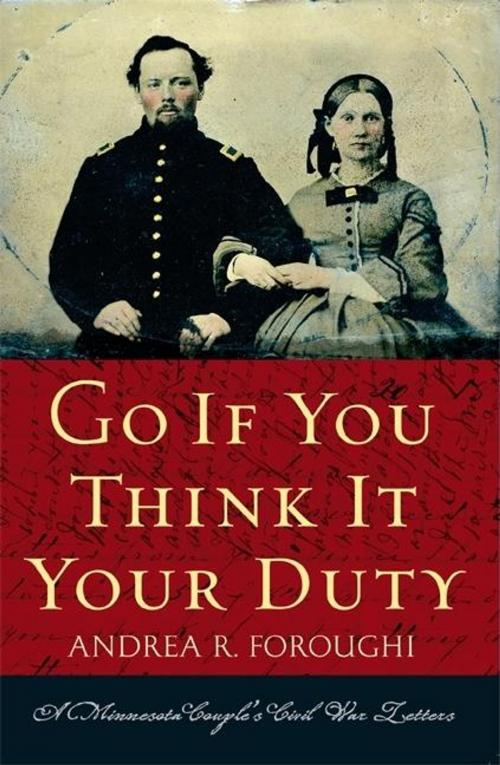Go If You Think It Your Duty
A Minnesota Couple's Civil War Letters
Nonfiction, History, Americas, United States, Civil War Period (1850-1877)| Author: | Andrea R. Foroughi | ISBN: | 9780873516716 |
| Publisher: | Minnesota Historical Society Press | Publication: | August 1, 2009 |
| Imprint: | Minnesota Historical Society Press | Language: | English |
| Author: | Andrea R. Foroughi |
| ISBN: | 9780873516716 |
| Publisher: | Minnesota Historical Society Press |
| Publication: | August 1, 2009 |
| Imprint: | Minnesota Historical Society Press |
| Language: | English |
During the American Civil War, James Madison Bowler and Elizabeth Caleff Bowler courted, married, became parents, and bought a farm. They attended dances, talked politics, and confided their deepest fears. Because of the war, however, they experienced all of these events separately, sharing them through hundreds of letters from 1861 to 1865 while Madison served in the third Minnesota Volunteer regiment and Lizzie stayed in Nininger, Minnesota. In four years, they spent only twelve weeks under the same roof. These poignant letters provided them a space to voice their fear for and frustration with each other, and they now provide readers with a window into one couple's Civil War.
"Go If You Think It Your Duty isn't the Civil War history of textbooks or lecture halls. It's the kind we seldom see—the kind tucked away in forgotten, dusty packets of letters in forgotten trunks in attic corners. The letters here are less about the war than about the hopes and concerns of a man who fought it and his wife waiting back home." —The Associated Press
During the American Civil War, James Madison Bowler and Elizabeth Caleff Bowler courted, married, became parents, and bought a farm. They attended dances, talked politics, and confided their deepest fears. Because of the war, however, they experienced all of these events separately, sharing them through hundreds of letters from 1861 to 1865 while Madison served in the third Minnesota Volunteer regiment and Lizzie stayed in Nininger, Minnesota. In four years, they spent only twelve weeks under the same roof. These poignant letters provided them a space to voice their fear for and frustration with each other, and they now provide readers with a window into one couple's Civil War.
"Go If You Think It Your Duty isn't the Civil War history of textbooks or lecture halls. It's the kind we seldom see—the kind tucked away in forgotten, dusty packets of letters in forgotten trunks in attic corners. The letters here are less about the war than about the hopes and concerns of a man who fought it and his wife waiting back home." —The Associated Press















